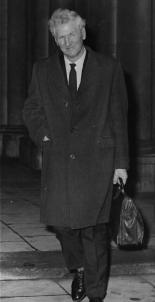
Sir William Lawrence Bragg, was an Australian-born British physicist and X-ray crystallographer, discoverer (1912) of Bragg's law of X-ray diffraction, which is basic for the determination of crystal structure. He was joint recipient of the Nobel Prize in Physics in 1915, "For their services in the analysis of crystal structure by means of X-rays"; an important step in the development of X-ray crystallography.
The Royal Society for Asian Affairs (RSAA) is a learned society based in London. Its objective is to advance public knowledge and understanding of Asia through its worldwide networks, its public events, its publications and its support to research. It is independent of governments and political bodies and does not take institutional positions on issues of policy at its meetings or in its publications.

Brigadier Henry Cecil John Hunt, Baron Hunt,, styled as Sir John Hunt from 1953 to 1966, was a British Army officer who is best known as the leader of the successful 1953 British Expedition to Mount Everest.

John Tuzo Wilson was a Canadian geophysicist and geologist who achieved worldwide acclaim for his contributions to the theory of plate tectonics.

Sir Charles William Chadwick Oman, was a British military historian. His reconstructions of medieval battles from the fragmentary and distorted accounts left by chroniclers were pioneering. Occasionally his interpretations have been challenged, especially his widely copied thesis that British troops defeated their Napoleonic opponents by firepower alone. Paddy Griffith, among modern historians, claims that the British infantry's discipline and willingness to attack were equally important.

Frederick A. YoungOBE, BSC was a British cinematographer. He is probably best known for his work on David Lean's films Lawrence of Arabia (1962), Doctor Zhivago (1965) and Ryan's Daughter (1970), all three of which won him Academy Awards for Best Cinematography. He was often credited as F. A. Young.

David George Hogarth, also known as D. G. Hogarth, was a British archaeologist and scholar associated with T. E. Lawrence and Arthur Evans. He was Keeper of the Ashmolean Museum, Oxford from 1909 to 1927.
The Victoria Medal of Honour (VMH) is awarded to British horticulturists resident in the United Kingdom whom the Royal Horticultural Society Council considers deserving of special honour by the Society.

The Michael Faraday Medal and Prize is a gold medal awarded annually by the Institute of Physics in experimental physics. The award is made "for outstanding and sustained contributions to experimental physics." The medal is accompanied by a prize of £1000 and a certificate.
The Victoria Medal is an award presented by the Royal Geographical Society. It is awarded "for conspicuous merit in research in geography" and has been given since 1902, in honour of the late Queen Victoria. Up until then, the society's Patron's Medal had alternatively been known as the "Victoria Medal", and the new medal resembled its original design.

Brigadier-General Sir Percy Molesworth Sykes, was a British soldier, diplomat, and scholar with a considerable literary output. He wrote historical, geographical, and biographical works, as well as describing his travels in Persia and Central Asia.
The Botanical Society of Scotland (BSS) is the national learned society for botanists of Scotland. The Society's aims are to advance knowledge and appreciation of flowering and cryptogamic plants, algae and fungi. The Society's activities include lectures, symposia, field excursions, field projects and an annual Scottish Botanist's Conference, held jointly with the Botanical Society of Britain and Ireland for exchange of information between botanists working in different areas. Its publications include a twice-yearly newsletter, BSS News, and a scientific journal, Plant Ecology & Diversity. The society is closely linked to the Royal Botanic Garden Edinburgh and the Scottish universities.
Fahd bin Sultan Al Saud has been the governor of Tabuk Province since 1987 and a member of House of Saud.
Geoffrey Morse Binnie FRS FEng was a British civil engineer and writer particularly associated with dams and reservoirs.
The Symons Gold Medal is awarded biennially by the Royal Meteorological Society for distinguished work in the field of meteorological science.
Doreen Ingrams was a British writer and colonial figure whose pioneering survey-work in South Arabia led to a memoir, A Time in Arabia (1970), and to "The Ingrams' Peace," a truce between warring tribes in the Hadhramaut in southern Arabia.
Fuad Hamza, also known as Fuad Bey Hamza, (1899–1951) was a Palestinian who served as Saudi ambassador to France and the United States and as King Abdulaziz's adviser and representative. Hafiz Wahba and he were the first ambassadors of Saudi Arabia, the former in the United Kingdom and the latter in France. In addition, they were among the advisers whom King Abdulaziz employed to improve the decision-making process of the state.
Yusuf Yasin was a journalist and politician who served in various capacities during the reign of King Abdulaziz and King Saud. He was among the advisers of King Abdulaziz who were employed to improve the decision-making process of the state. Yasin performed several roles in the Saudi government until 1958 when he was dismissed by Crown Prince Faisal.







